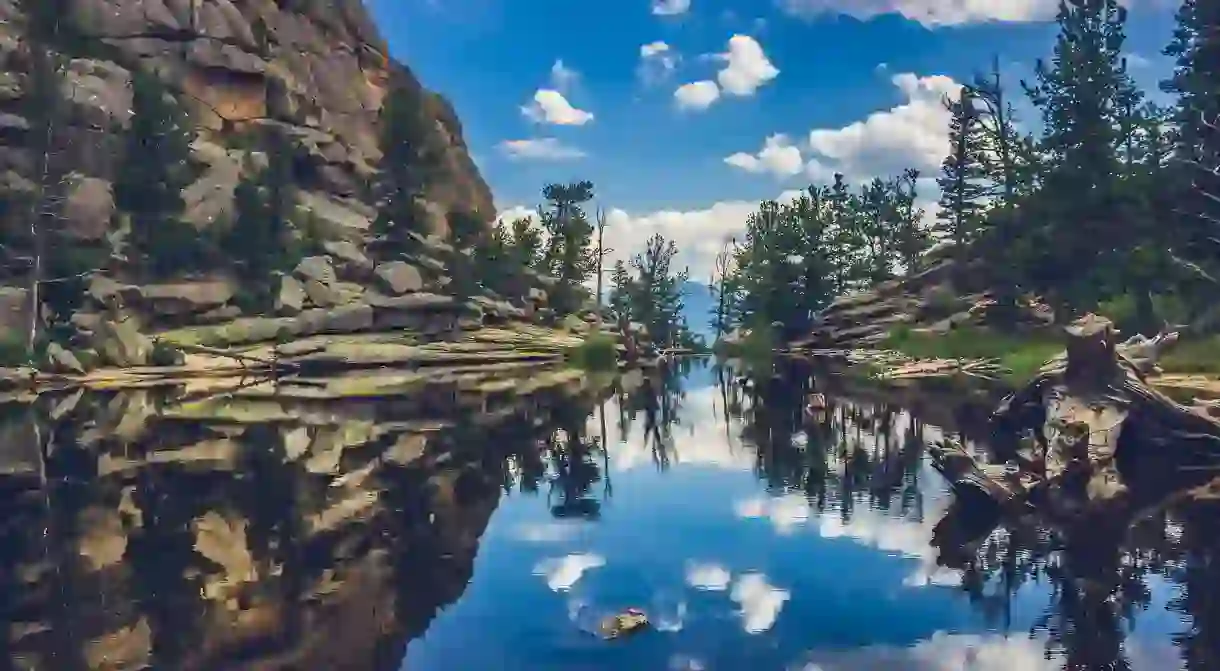The Best Hikes in Rocky Mountain National Park

Lace up those boots for the best hiking trails in the Rocky Mountain National Park, Colorado, for majestic views of Bear Lake and Longs Peak.
Spanning 415sqm (1,075sqkm) of wilderness, the Rocky Mountain National Park is the best place for hiking in northern Colorado – and you can now go there with Culture Trip on our action-packed eight-day Colorado and Utah adventure. Trails weave through aspen groves, which reveal views of snow-capped mountains and glistening alpine lakes. Watch out for the black bears, elk and marmots who call this region home. We’ve put together a rundown of the best Rocky Mountain National Park hikes.
Easy
Bear Lake
Natural Feature, Hiking Trail
Black bears and grizzlies both once roamed this forest — now, it’s just black bears. Get acquainted with their neighborhood on this 0.8mi (1.3km) nature trail dotted with interpretive signs. Loop around the lake, passing through spruce, fir, lodgepole pine, and a massive aspen grove that turns gold in fall. A hard-packed surface with just a few steep sections makes this a family-friendly choice.
Alberta Falls
Natural Feature, Hiking Trail

Glacier Creek roars down a granite corridor and drops 30ft (9m) at Alberta Falls, reached by a 1.7mi (2.7km) hike. The route climbs steadily, but it’s just 200ft (61m) of elevation gain. Follow a well-marked trail across Chaos Creek, then dip in and out of pine forest and aspen groves. The waterfall is named after one of the first homesteaders in Estes Park, whose house became a lodge for hunting and fishing.
Coyote Valley Trail
Natural Feature, Hiking Trail

Meander along the Colorado River, just 10mi (16km) downstream from its headwaters in the Never Summer Mountains, and along the Kawuneeche Valley, which bursts with wildflowers in spring. Pack a picnic lunch with plans to spend time scanning the wetlands for elk and moose; keep an eye out for the namesake coyotes, hawks, beaver, golden eagles, and perhaps even a river otter.
Dream Lake
Natural Feature, Hiking Trail
Climb steadily past the eastern shore of Bear Lake, one of the most photographed in the park, passing Nymph Lake with its halo of water lilies. Catch glimpses of Longs Peak and Hallett Peak through the trees. At Dream Lake, reached at 1.1mi (1.8km), enjoy views of the nearby mountains and a white sliver of Tyndall Glacier, one of the last remaining glaciers in the area.
Moderate
Gem Lake
Hiking Trail, Natural Feature

Gem Lake hides in Lumpy Ridge, a string of rocky outcroppings near Estes Park. The lake itself is a rarity, formed in a granite basin that traps snowmelt and rainwater. No spring or stream supplies it. Reach the lake by hiking through a narrow, boulder-strewn canyon, ascending switchbacks so tight they almost stack on top of one another. The final push is up steep rock stairs, many of which rise 2ft (0.6m) in a single step.
Cascade Falls
Natural Feature, Hiking Trail
After walking just over 3mi (5km), it could be tempting to call the view from the bottom of Cascade Falls reward enough. But scramble up and you’ll have the opportunity to look down on the granite chute funneling water into the 40ft (12m) falls. The hike skirts a large montane meadow called Summerland Park, often spotted with wildflowers and elk herds.
Black Lake
Natural Feature, Hiking Trail

The bounty on this trail astounds: pass Alberta Falls, enter Glacier Gorge, skirt the side of Mills Lake and then Jewel Lake. The Keyboard of the Winds, a series of spires that channel wind into making unearthly sounds, and the 13,000ft (3,962m) tall Pagoda Mountain and Chiefs Head Peak, loom on the skyline. The trail then ascends along the edge of Ribbon Falls, finally reaching Black Lake, an alpine lake in a cirque of peaks.
Hard
Sky Pond
Natural Feature, Hiking Trail
A trio of lakes string together on this 9mi (14.5km) hike. Loch Vale ranks as one of the most studied watersheds in the world, with continuous research underway since 1982. Watch for the 100ft (30m) Timberline Falls to appear above, and hike to it on a lung-busting steep section. Scramble up a chute beside the falls to reach the Lake of Glass, then cross more rugged terrain to reach Sky Pond, filling a nook scooped out of the granite.
Flattop Mountain to Hallett Peak
Natural Feature, Hiking Trail

Weave through aspen groves, then head up the eastern slope of Flattop Mountain, pausing to peer down on lakes below. The forest shrinks away to scrub pine and the views open even wider into Glacier Basin. At the 12,713ft (3,875m) summit, you’re standing on the Continental Divide, the geologic median for the nation’s waterways. In another 0.7mi (1.1km) and just 389ft (119m) of climbing, you can summit Hallett Peak too. Pack for all weathers and plan to be back below treeline before afternoon thunderstorms hit.
Mount Ida
Natural Feature, Hiking Trail
This trail breaks out of subalpine forest and into open tundra, pulsing over vicious inclines to get there, including crossing another peak, dropping into a saddle, and then climbing up again toward the Mount Ida summit. The last 1.2mi (1.9km) demand route-finding skills to follow a patchy trail over the talus. Listen for the whistles and chirps of marmots and pikas, which live only in these high boulder fields. From the summit, look down into a cirque, 1,000ft (305m) below, spotted with a pair of lakes.













